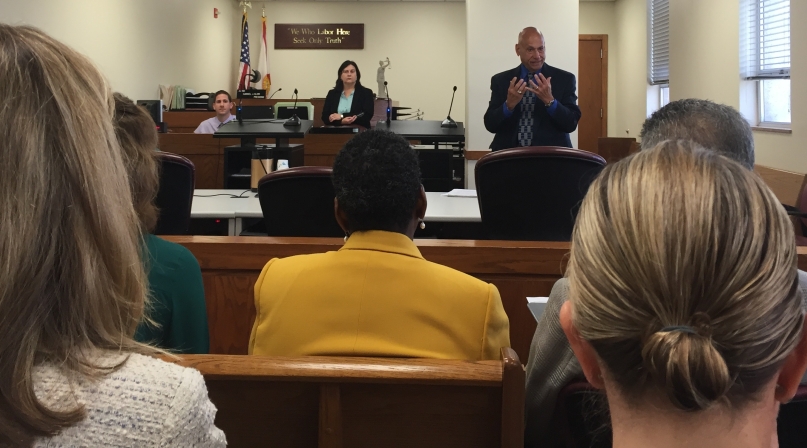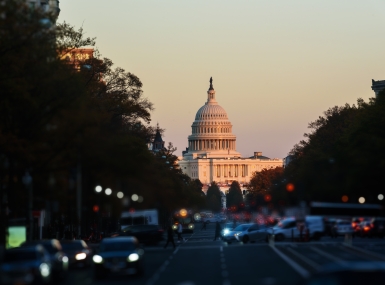Miami-Dade Peer Exchange provides glimpse of timely local criminal justice reforms
Upcoming Events
Related News

Samuel Slom, administrative judge of the County Criminal Division for the Eleventh Judicial Circuit of Florida, briefs Miami-Dade County peer exchange attendees on the county's driver's license reinstatement event. Photo by Hadi SedighMore than 600 Miami-Dade County, Fla. residents had a chance to restore their driving privileges
The Northeast Dade Driver’s License Reinstatement Day took place March 18 in Miami, Fla. and coincided with a peer exchange hosted by Miami-Dade County Commissioner Sally Heyman, who chairs NACo’s Justice and Public Safety Steering Committee.
The peer exchange gave county leaders from across the country an opportunity to see Miami-Dade’s justice programs and initiatives, including the reinstatement event, which gave more than 600 Miami-Dade residents a chance to regain driving privileges that had been revoked, usually due to outstanding fines stemming from traffic citations.
In welcoming remarks at the peer exchange, Judge Samuel Slom, administrative judge of the County Criminal Division of the 11th Judicial District of Florida, described the reinstatement event as an opportunity for Miami-Dade County to revisit and adjust fines that may have been unreasonable — for example, a $210 fine assessed for non-payment of a $1 toll.
Many of the Miami-Dade residents present at the reinstatement event had accumulated a number of these fines, resulting in outstanding debts often exceeding $2,000.
The reinstatement event seemed aptly timed, given that earlier that same week, the U.S. Department of Justice (DOJ) had published a letter discussing how excessive fines can run afoul of the U.S. Constitution or other federal laws.
In the letter, DOJ put forth the following principles applicable to the enforcement of fines and fees:
- Courts must not incarcerate a person for nonpayment of fines or fees without first conducting an indigency determination and establishing that the failure to pay was willful.
- Courts must consider alternatives to incarceration for indigent defendants unable to pay fines and fees.
- Courts must not condition access to a judicial hearing on the prepayment of fines or fees.
- Courts must provide meaningful notice and, in appropriate cases, counsel, when enforcing fines and fees.
- Courts must not use arrest warrants or license suspensions as a means of coercing the payment of court debt with individuals who have not been afforded constitutionally adequate procedural protections.
- Courts must not employ bail or bond practices that cause indigent defendants to remain incarcerated solely because they cannot afford to pay for their release; and
- Courts must safeguard unconstitutional practices by court staff and private contractors.
It is not clear how many jurisdictions across the country currently employ fines-and-fees practices that might violate these principles, but a recent White House report states that “tens of millions of individuals in the United States have been assessed fines or fees as part of the punishment for a criminal offense.”
That said, the report also makes clear that the use of fines and fees by local jurisdictions is a result of budget pressure stemming in large part from increased criminal justice expenditures driven by the dramatic expansion of the U.S. criminal justice system in the last several decades.
According to the report, between 1990 and 2014, nationwide incarceration rates increased by 61 percent; meanwhile, between 1993 and 2012, local expenditures on criminal justice also increased by 61 percent.
Given that local fees and fines practices seem to have stemmed in large part from budgetary pressures and strains, counties wishing to reform their practices may find their reforms to be fiscally problematic or even impractical, at least in the short term.
In Miami-Dade, Slom addressed this tension between reducing fees and fines and funding county criminal justice systems; according to him, the individuals participating in the reinstatement event were unable to pay their outstanding debts, and as a result, the adjustment of those fees would not significantly impact the county’s revenue.
Miami-Dade County Clerk Harvey Ruvin — a former Dade County commissioner who served as NACo president in 1987–1988 and whose office is currently charged with overseeing and auditing all county funds — was on hand to lend Slom the clerk’s office’s support.
For all involved, the Miami-Dade reinstatement event seemed to serve as an example of effective and rational criminal justice reform that could serve as a model to localities that are reassessing their justice practices — especially in light of the DOJ letter.
Yet, given the budgetary pressures that led to the establishment of some of the practices now under scrutiny, and the varying rates of economic recovery across the country following the recent recession, it will remain to be seen whether localities can replicate the recipe that seems to be working so well in Miami.
Attachments
Related News

President Trump signs Laken Riley Act into law
On January 29, President Trump signed the bipartisan Laken Riley Act into law, requiring the U.S. Department of Homeland Security to detain any undocumented immigrant who has been arrested for violent or property-related crimes and giving states new authority to sue the federal government over certain immigration-related decisions.

Congress reintroduces 9-1-1 SAVES Act
On January 16, the 9-1-1 Supporting Accurate Views of Emergency Services (SAVES) Act was reintroduced in the U.S. House of Representatives. This legislation aims to officially reclassify 9-1-1 dispatchers as first responders, granting these professionals the recognition they deserve for their vital contributions to public safety.

Los Angeles County aims to recover and rebuild after historic wildfires
Over a week after a series of deadly fires sparked across Los Angeles County, at least 25 people are dead, thousands of structures, including businesses and homes, have been destroyed and roughly 100,000 people across the county have been displaced.